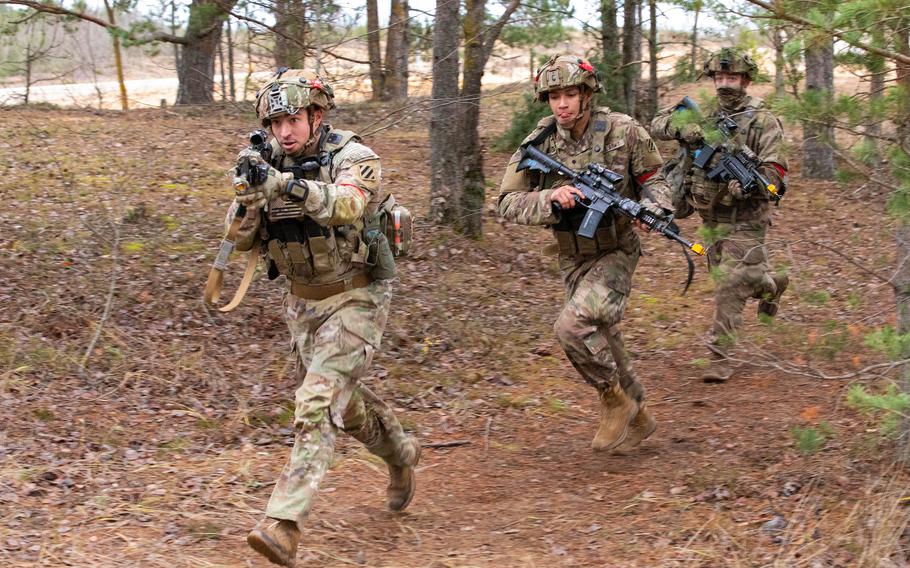
U.S. soldiers execute tactical movement at Pabrade Training Area in Lithuania on Nov. 17, 2023. A report released this week found that the goals of the Army's People First initiatives are at odds with soldiers' training objectives and benchmarks. (Cesar Salazar Jr./U.S. Army)
An initiative developed by the Army to deal with a culture crisis has failed to get the job done because its objectives conflict with other priorities, like training for combat, a new service-sponsored study said.
The Army’s People First initiatives set goals that are at odds with demands of the training benchmarks for soldiers, according to a Rand Corp. report released this week.
“At the unit level, soldiers perceive that incentives are based on training outcomes and that there is little recognition or reward for People First outcomes,” the report said. “Soldiers rely on other soldiers first and big Army last when faced with work-life balance challenges.”
Researchers had been asked to examine ways to overcome problems associated with the conflict between mission requirements and work-life balance, given the Army senior leadership’s focus on putting people first.
The findings showcase the difficulty in revamping a culture damaged by high-profile instances of sexual assault, misconduct and violence, such as the 2020 murder of Spc. Vanessa Guillen by a fellow soldier at the Texas base formerly known as Fort Hood.
After a scathing 136-page internal report detailed widespread problems at the base, now called Fort Cavazos, the Army came up with the People First concept to address culture issues across the service.
Sine then, a patchwork of programs has been developed with the goal of improving command culture and team-building at the unit level.
But while the Army’s top generals and senior enlisted leaders have touted their focus on improving soldiers’ quality of life, those efforts break down when the rubber hits the road, according to researchers.
“Put simply: The message of ‘People First’ is not reaching the officers and staff NCOs in charge of managing and training soldiers with anything near the priority that the Army’s senior leadership has set,” Rand said.
Although top Army leaders provide guidance on managing decisions related to matters such as soldiers’ time off, those lessons are not “evenly heard or understood at lower levels,” Rand said.
One reason for that is the message gets diluted as it moves down the chain of command.
For example, the chief of staff of the Army and other four-star leaders may set priorities that allow for a degree of readiness risk when balancing quality of life concerns, but the trickle-down takeaway is that improving combat readiness is the overriding imperative.
“The People First priorities had disappeared or had been so subsumed into readiness language that it was clear that the focus was on training, not people,” Rand said.
Moreover, units perceive no discernable reward for excelling at People First initiatives compared with the clearer career-boosting incentives of achieving training goals.
Unit leaders told Rand that when so-called “white space” was on their calendar to allow for people-oriented matters rather than specific missions, higher headquarters tended to fill that time up with other taskings.
Soldiers interviewed by Rand said the Army should identify opportunities to assess a leader’s commitment to People First concepts in officer and noncommissioned officer performance reviews, known as OERs and NCOERs, respectively.
“Having something that says, ‘List 8 People First accomplishments you oversaw’ (in an OER) would go a long way,” one soldier told Rand.
Researchers made a series of recommendations to address the problems. They concluded that “striking the right balance ... will have an impact on how the Army recruits and retains its strength.”